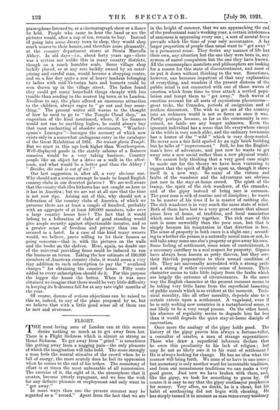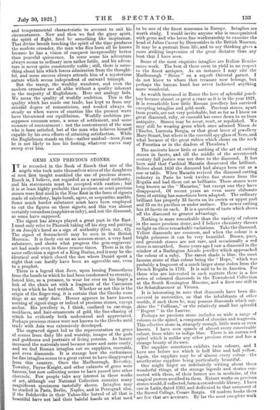FLIGHT. T HE most loving sons of London can at this
season desire nothing so much as to get away from her. There is a Flight Sickness which is almost as strong as Home Sickness. To get away from " grind " is sometimes like getting away from a nagging pain—the only pleasure of which the imagination will take hold. The more strongly a man feels the mental stimulus of the crowd when he is full of energy, the more acutely does he feel its oppression when he comes to the end of his tether. The monotony of effort is at times the most unbearable of all monotonies. The exercise of it, the sight of it, the atmosphere that it creates, become utterly repugnant, and we lose the wish for any definite pleasure or employment and only want to "get away."
In more ways than one the present summer may be regarded as a "record." Apart from the fact that we are in the height of summer, that we are approaching the end of the professional man's working year, a certain intolerance of sameness is oppressing every one ; a sort of mental fever prevails which the time of year only accentuates. A far larger proportion of people than usual want to " get away" in a permanent sense. They desire any manner of life but their own, any situation but the one they were born in, any system of moral compulsion but the one they have known. All the commonplace moralists and philosophers are looking for a reason for this state of discontentment, and most of us put it down without thinking to the war. Sometimes, however, one becomes impatient of that easy explanation of everything, and wonders if the present distress of the public mind is not connected with one of those waves of emotion which from time to time attack a settled popu- lation and tempt them to "get away." Such waves of emotion account for all sorts of mysterious phenomena— great treks, the Crusades, periods of emigration and of restless discontent. The wish to get out of the country into an unknown world is not so fierce as once it was. Partly perhaps because, so far as the community is con- cerned, no lands are any longer unknown. Even the ignorant individual has a sense that life everywhere except in the wilds is very much alike, and the ordinary townsman has a horror of the " wild " which is very deep-rooted. He never sees a fair field spoiled by an ugly brick building but he talks of "improvement." Still, he has the English- man's love of adventure, and just now he wants to get away into a new social rather than a new physical world. We cannot help thinking that a very good case might be made out for the theory we have been venturing to suggest that the spirit of ffight is upon us, though it shows itself in a new way. So many of the virtues and faults of the wanderer and the adventurer are obvious just now in the stay-at-home crowd. The spirit of the tramp, the spirit of the rich wanderer, of the crusader, and of the gipsy instead of being rare is common. The poor man is sick of routine and of discipline ; he wants to be master of his time if he is master of nothing else. The rich wanderer is in very much the same state of mind. Both of them have lost to a very great extent that almost pious love of home, of tradition, and local association which once held society together. The rich man of this sort is more unworldly than the poor man, but that is simply because his temptation in that direction is less. The sense of property in both cases is a slight one ; accord- ing to whether the person is a naturally moral man or not, he will take away some one else's property or give away his own. Some feeling of settlement, some sense of contentment, is a necessary corollary to a real respect for property. Gipsies have always been known as petty thieves, but they owe their thievish propensities to their nomad condition of life. They are universally accredited with a strong pride and a strong if rather eccentric sense of honour. Their character seems to take little injury from the faults which are largely the outcome of circumstances. In the same way the English character at the present moment seems to be taking very little harm from the superficial loosening of public morals which is so evident at the moment. Tech- nical morality, like all other morality, depends also to a certain extent upon a settlement. A vagabond, even if he is only seeking new countries in a metaphorical sense, is not likely to be a very range person. On the other hand, his absence of regularity seems to degrade him far less than it would degrade the quiet stay-at-home disciple of convention.
Once more the analogy of the gipsy holds good. The history of the gipsy proves him always a. fortune-teller, a consulter of oracles, a man of strange superstitions. Those who draw a superficial inference declare that he owes this peculiarity to his lack of religion ; but may he not as likely owe it to his want of settlement ? He is always looking for change. He has no idea, what the morrow will bring forth. We none of us have in one sense ; but monotony is only another word for immutable tradition, and from our monotonous traditions we can make a very good guess. Just now we have broken with them, and, like the gipsy, we look for something to guess by. Of course it is easy to say that the gipsy soothsayer prophesies for money. Very often, no doubt, he is a cheat, but his habit of soothsaying did not begin with cheating. He has simply turned it to account as man turns every tendency and temperamental characteristic to account to suit his circumstances. Now and then we find the gipsy spirit, the spirit of flight, fired by something like inspiration. That divine breath touching the spirit of the time produces the modern crusader, the man who flies from all he knows because he has a vision of conquest inexpressibly better than peaceful quiescence. In some sense his adventure always seems to ordinary men rather futile, and his adven- ture is never quite consistently noble ; still, there is some- thing about him which forces admiration from the thought- ful, and some success always attends him of a mysterious nature which seems independent of outward triumph. But the tramp, the wealthy wanderer, and even the modern crusader are all alike without a quality inherent in the majority of Englishmen. Here our analogy fails. We mean the quality of worldly ambition. This is the quality which has made our trade, has kept us from any suicidal degree of romanticism, and tended always to steady us when waves of emotion like the present wave have threatened our equilibrium. Worldly ambition pre- supposes common sense, a sense of settlement, and some measure of contentment : not the contentment of the man who is born satisfied, but of the man who believes himself capable by his own efforts -of attaining satisfaction. While the Englishman stands on this—rather unideal—terra firma he is not likely to lose his footing, whatever waves may sweep over him.



































 Previous page
Previous page